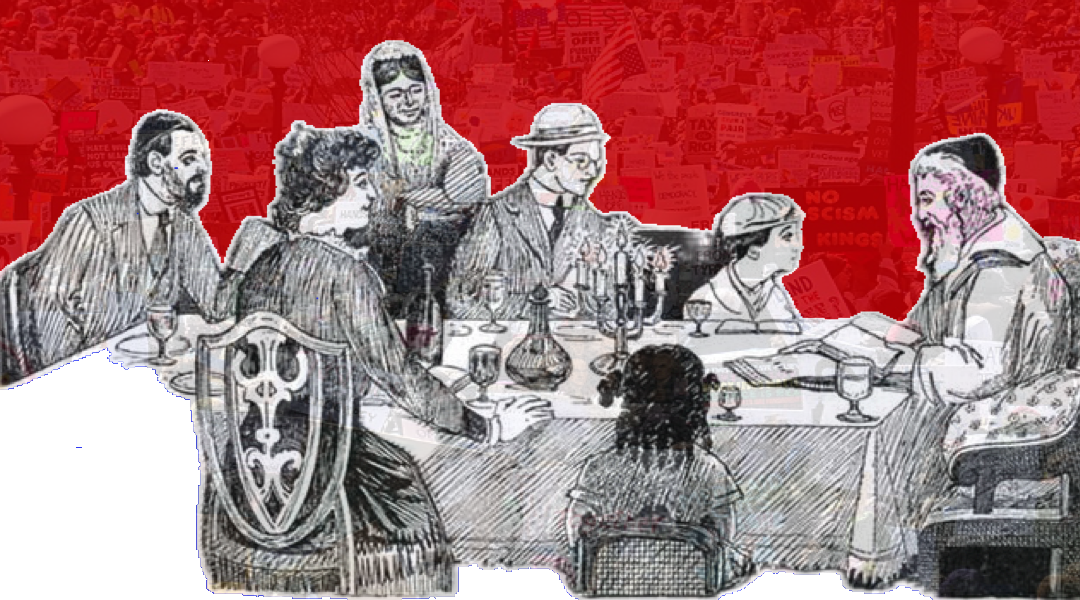Revolutionaries throughout the ages have drawn strength from the story of Passover. As Michael Walzer brilliantly documents in his book “Exodus and Revolution,” the Israelites leaving Egypt inspired liberation movements and thinkers throughout history, from the French Revolution to the Puritans, and even Marx.
The African-American spiritual “Go Down Moses” and the inscription on the Liberty Bell — “Proclaim liberty throughout all the land unto all the inhabitants thereof,” quoting Leviticus — are just two well-known invocations of the Exodus as a call to freedom.
Moses and the Israelites steadfastly stood up to their oppressors. Prevailing against the odds, they trudged through the desert for 40 years in order to get to the Promised Land. Determined humans that join together with vision and strategy can bend the arc of history towards justice and make redemption possible.
But with freedom comes tremendous responsibility. For this reason, the Torah could imagine that a slave, afraid of what freedom might entail, would choose to say, “I love my master … I do not wish to go free” (Exodus 21:5). The Torah understood that the weight, insecurity and uncertainty of self-determination could sometimes feel unbearable.
The responsibility that comes with freedom is terrifying and onerous, even if it makes life meaningful. Perhaps Erich Fromm said it best in his 1941 book, “Escape From Freedom”: “Is there not also, perhaps, besides an innate desire for freedom, an instinctive wish for submission? If there is not, how can we account for the attraction which submission to a leader has for so many today?”
Fromm’s warnings seem all too relevant today with the election of governments worldwide that seem ready and willing to trample on cherished civil protections. The celebration of freedom and human rights — which once seemed to be the norm in democratic regimes across the world — turns out to have been premature.
Long ago, the Torah warned against the dangers of rulers with excessive power. If we must appoint a king “like the non-Jews,” their authority must be carefully limited. A ruler with too much money and too large an army will become haughty and oppressive. A king must carry the sacred law with him at all times to remind him that he is not above it (Deuteronomy 17). For the Torah, a balance of powers was the path to protection. The rabbis further expanded on the importance of separation of powers and checks and balances — legislating “three crowns,” dividing power among rabbis, priests and a king. The demand that the Sanhedrin, the pre-exilic supreme court, include 70 members reflected a commitment to the idea that Torah itself has multiple interpretations and that justice is served by pluralism of opinions.
What are we to do as narrowly elected governments break long-standing democratic norms, disregard ethics and accountability, and push agendas that impinge on the delicate balance of freedom long held to be unshakable? Protesting is absolutely essential, as I have personally witnessed. Israelis have been turning out weekly and even daily in the tens of thousands for years on end, demonstrating tremendous resilience in their fight for government accountability, independent courts, and minority protections.
But even as I hope these protests can be a source of inspiration for others facing their own national crises, we must recognize the potentially negative impacts of this fraught discourse. The hatred and delegitimization of government may feel justified, but we must guard against a cycle of demonization and polarization that contracts common ground even further. The heated, often personal rhetoric and imagery that characterizes today’s civil discourse feeds a vicious cycle that undermines our social fabric and stymies compromise and understanding.
The Passover seder provides another model — that of embracing and amplifying our shared national narrative. We have journeyed all this way from Egypt together. Moses’ brother Aaron made peace by shuttling between two conflicting parties, exposing common values and shared narratives and reducing the perceived gaps between sides. The seder is an opportunity to come together as one family across social and political divides without an intermediary, to celebrate the shared history, purpose, and good intentions of all. Sharing in this way can be a true act of freedom and one that continues to perpetuate our collective freedom.
Michael Walzer said it best when he declared: “We still believe, or many of us do, what the Exodus first taught about the meaning and possibility of politics and about its proper form: First; that wherever you live, it is probably Egypt; second; that there is a better place, a world more attractive, a promised land; and third, that the way to the land is through the wilderness. There is no way to get from here to there except by joining together and marching.”
This year, may we rejoice in the true celebration of freedom through embracing our shared narratives as well as our differences and coming together on seder night.
JTA has documented Jewish history in real-time for over a century. Keep our journalism strong by joining us in supporting independent, award-winning reporting.







